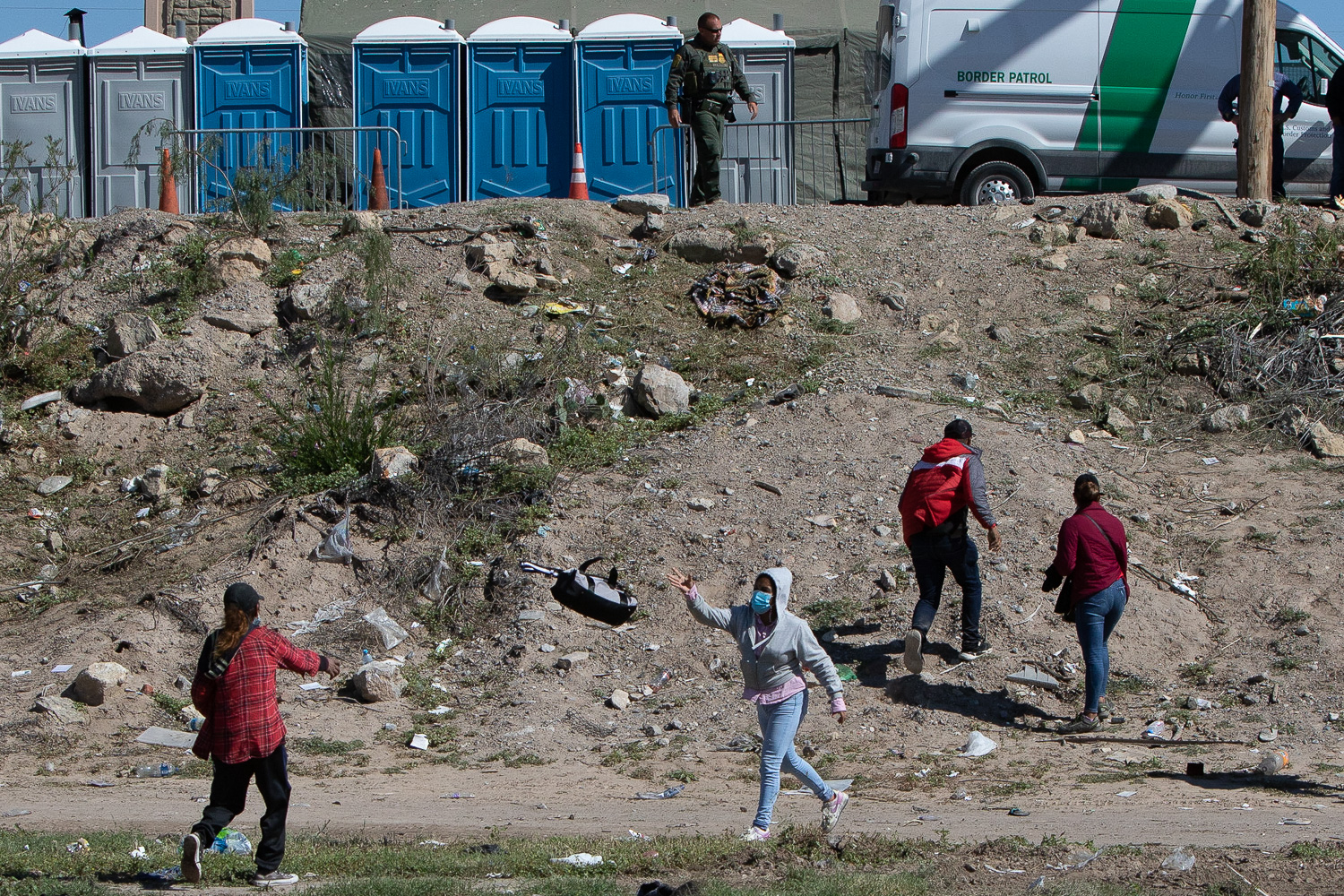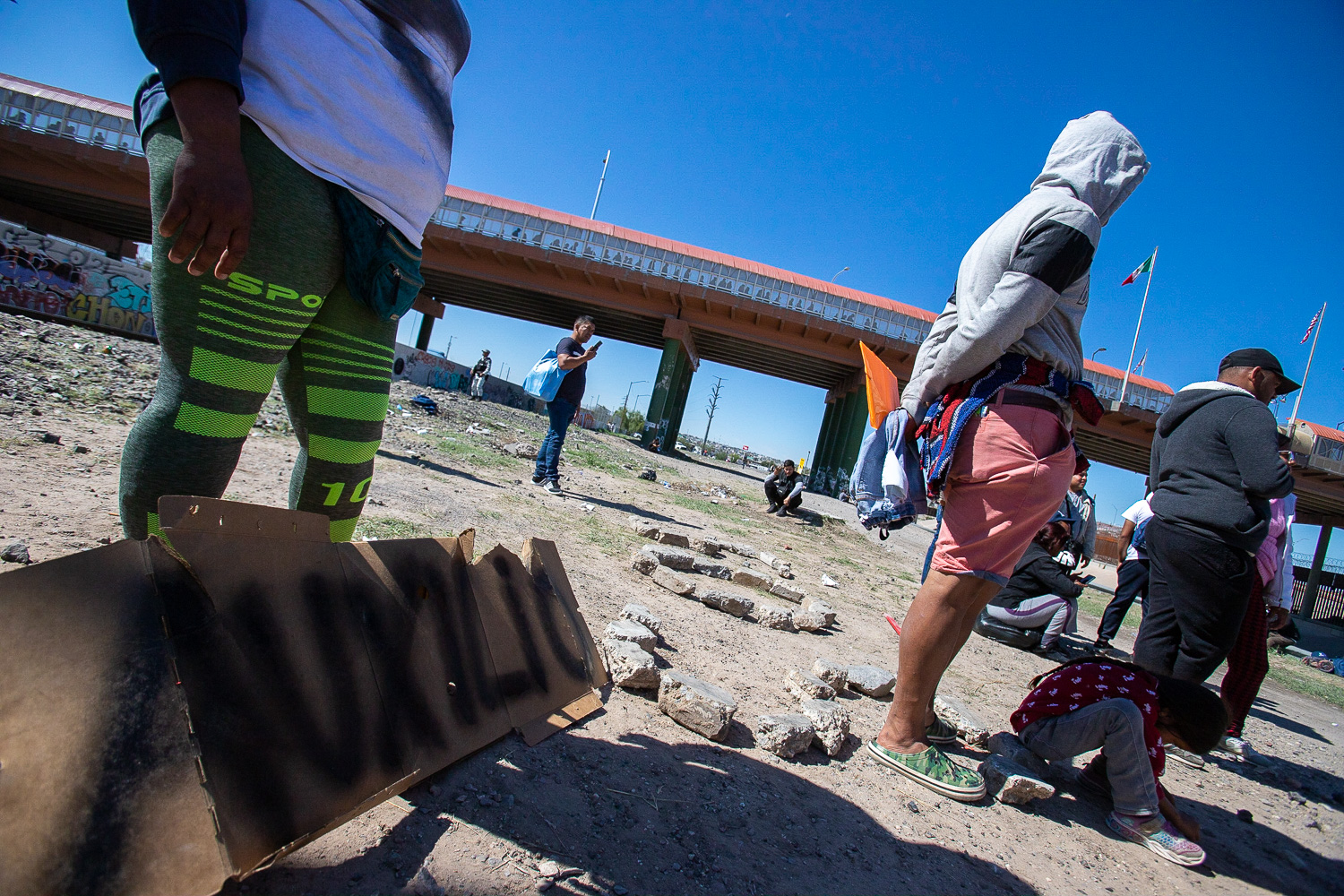CIUDAD JUÁREZ — The sun shone on dozens of Venezuelan migrants gathered on the southern bank of the Rio Grande. They stood in small huddles or sat on pieces of cardboard and discarded clothing, all looking in one direction: across the river to the Border Patrol’s temporary processing center beneath El Paso’s Loop 375 overpass.
“As a child I watched a lot of Mexican movies and I would cry when I would see how they wanted to cross the border,” Maria, a 40-year-old woman from Venezuela, said on Wednesday. She sat alongside her friend, Jenny, and watched the movement across the river. “Who would have thought that I would be living out those movies now?”
One week earlier, more than 2,000 migrants were crossing into El Paso every day. Most of them were processed and released to travel elsewhere in the United States. But that changed on Oct. 12 when the Biden administration announced that the United States would use Title 42, a public health order, to expel Venezuelans crossing the southern border between ports of entry.

The sudden shift in policy means that nearly 1,600 Venezuelans have been expelled into Juárez as of Oct. 20, according to Alberto Cabezas, communication officer for the United Nations’ International Organization for Migration (IOM) in Mexico.
“They put us on a bus and put a padlock on the door, like we were prisoners,” said Marian, 34, who traveled to the United States with her husband, Alvaro, and their 14-year-old daughter. “Then we got out, they lined us up and we started walking. We did not realize until we saw the Mexican flag that they had sent us across (the border).”
El Paso Matters does not use the full names of migrants because they often face threats of violence in their home country or during their travels.
The family had crossed the border into El Paso on Oct. 7, before the Title 42 policy was announced. On Oct. 16, they were expelled to Juárez.

“We have been sleeping on the street, in the cold,” Alvaro said. “We come here (to the river) so that (the United States) will see us and maybe give us an opportunity to enter.”
It is unclear what plans the United States or Mexico had in place to attend to the needs of the thousands of migrants. Some of those expelled, like Marian and Alvaro, said the Mexican National Institute of Migration gave them a document that allows them to stay in the country for 30 days. Others were given 14 days or seven days.
“What worries us is their basic needs for food and a safe place to stay,” Cabezas said. “There is also confusion about why some of them are given 14 days, others 30 days. We do not know why it is not homogenous.”
Maria, 40, who asked that her real name not be used because her family does not know she migrated, arrived in Juárez and crossed the border into El Paso on the afternoon of Oct. 13 with her husband. They turned themselves in at the temporary processing center and were sent to separate detention centers. She was expelled back to Juárez on Monday with other women.

“We were all crying. There were no answers, there were no explanations,” she said in Spanish. “Until we arrived at the border, we did not know that we were being expelled.”
She has not seen her husband since they were separated last week, but he was released from detention and allowed to travel to Chicago to reunite with relatives. Neither of them knows why Maria was expelled and he was not.
“I know I should respect the laws of each country,” Maria said. “But we are all human beings. If the world was not separated by political division, where would you be? Maybe in my house. But when there are divisions and borders, this is what happens. And it’s just by chance what happens (politically) in each country.”
Jenny arrived in Juárez after the expulsions began, so she did not attempt to cross the border. Both women were told that they had 14 days to leave Mexico, but they do not have money left to travel anywhere nor any place to go.

“There is a crisis in Venezuela. The homes are worth nothing. The cars are worth nothing,” Maria said. “Whatever amount (of money) people could manage to save, was to get them here.”
The two women recounted stories of their journey – a traveling companion who nearly drowned while crossing the Darién Gap, threats and extortion from police in Guatemala, meeting distraught women who had lost children along the way.
“It’s just hard to go through all that and make it all the way here, for nothing,” Jenny said.
While a Juárez resident arrived to hand out foil-wrapped burritos to the Venezuelan migrants, four teenagers walked around the area with bags and picked up trash. They arrived in Juárez two days earlier but decided not to attempt to cross the border after witnessing the Title 42 expulsions.
“I’m just trying to make it look a little nicer while we are waiting,” said 17-year-old Giancarlo. He gazed across the river as other groups of migrants continued to cross the border. “Maybe something will change.”

Jenny was doubtful that the administration’s stated policy of admitting 24,000 Venezuelans will be of much help.
“If you meet like 10 or 15 of the requirements, but you’re missing just one, you don’t get in,” she said. “Maybe1% of Venezuelans will be able to enter. It won’t be for everyone, not even for 24,000. It’s more like they are saying, ‘It’s over, bye. Get out of here.’”
The International Organization for Migration in Mexico has criticized the continued use of Title 42, which was put in place in 2020 by the Trump administration at the outset of the COVID-19 pandemic. The Biden administration had pledged to unwind the policy but was blocked by the courts. It then expanded the policy this month to include Venezuelans.
“We remain concerned by asylum restrictions that are inconsistent with international law standards, including those imposed through Title 42 public health action, and reiterate the call for their urgent termination,” the migration organization said in an Oct. 14 statement. “We have repeatedly brought attention to the negative impact of these restrictions on asylum seekers and migrants at the border.”

In Juárez, Maria and Jenny have slept near the train tracks along the river and eaten donated food. They have not been offered space in a shelter, but Maria said that she is not sure she would go to one anyway.
“We don’t trust them,” she said. “What if we go stay there, and they turn us over to immigration?”
Instead, with hundreds of their fellow Venezuelans, they pass the time walking back and forth from the river bank to the offices of the State Population Council at the foot of the Paso del Norte bridge – always within sight of the border.
“Hope keeps us here,” Jenny said.


